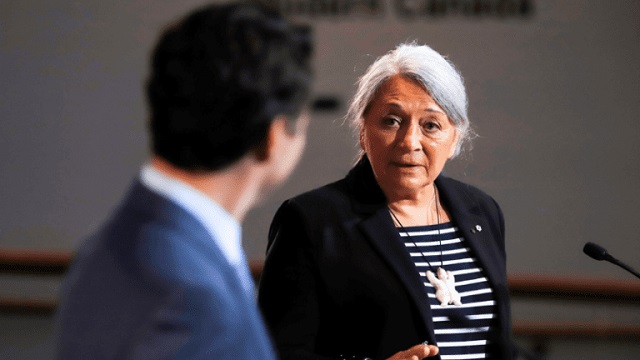MacDonald Laurier Institute
Canada is completing Confederation

From the MacDonald Laurier Institute
By Ken Coates
For generations, decisions about the North were made in Ottawa. While consultations improved, final decisions still rested outside the territory. That has now ended.
Something important is up in the Far North. With the signing of the Nunavut Devolution Agreement, Canada is completing Confederation.
Prime Minister Justin Trudeau travelled to Iqaluit to join Nunavut Premier P.J. Akeeagok, Nunavut Tunngavik Inc. president Aluki Kotierk, and federal Northern Affairs Minister Dan Vandal on Jan. 18, 2024, to sign the history-making document. What seems to be a technical administrative process is, in fact, a transformative event in the evolution of the North.
Canadians have had trouble coming to terms with their status as a colonial power, both on the broad front of the mismanagement of Indigenous affairs, and the more traditional colonial control exerted over the territories. In 1870, the Northwest Territories stretched from the Rocky Mountains to Labrador, and the 49th parallel to the Arctic Ocean and much of Baffin Island—much larger than the original four provinces.
Over more than 150 years, Canada slowly peeled back its colonial holdings. Manitoba grew from a “postage stamp” province to its current dimensions. Alberta and Saskatchewan were carved out of the Northwest Territories. The Arctic Islands were added in 1880. The Yukon gained separate territorial status in 1898. Ontario and Quebec had their boundaries extended northward. The remaining lands of the Northwest Territories covered much of the Far North until Nunavut was created as a separate territory in 1999.
The establishment of provincial and territorial boundaries did not establish political fairness across the country. Alberta, Manitoba, and Saskatchewan only secured control over natural resources in 1930, although the lack of consultation with Indigenous Peoples has resulted in a recent court challenge about the exclusion.
The Yukon only got responsible government in 1979; before then, the Yukon and the Northwest Territories were controlled by federally appointed commissioners.
When Canada patriated the Constitution, the final agreement virtually foreclosed the prospect of the Yukon, the Northwest Territories and Nunavut ever achieving full provincial status.
Given less than a perfect hand, the northern territories have systematically negotiated their way into partnership in Confederation. Modern treaties and self-government agreements that now cover much of the Yukon and Northwest Territories and all of Nunavut re-empowered Indigenous Peoples.
Devolution—the transfer of responsibilities (and the funding associated with these duties) from the federal government to the territorial governments—reduces the power of Ottawa and brings the territorial governments closer to province-like status.
The process unfolded slowly. The territories assumed responsibility for health care, education, highways, and many other duties over time.
But the most important transition, the transfer of responsibility for land and natural resources, remained to the end.
The recent Iqaluit signing was a celebration of this crucial stage. The agreement gives Nunavut province-like powers over resource development and land use.
The agreement promises a different future. Nunavut has impressive mineral resources and considerable opportunities to develop them. Akeeagok and his colleagues emphasized the importance of resource control and their eagerness to do it right, making it abundantly clear that the people of Nunavut are determined to change decision-making about the territory. This point is critical—and it is the main purpose of devolution.
For generations, decisions were made in Ottawa, with no direct engagement with the people of the territory. Judgments reflected southern or national priorities and not necessarily northern needs. While consultations improved, final decisions still rested outside the territory. That has now ended.
The transfer does not signal a retreat of the federal government from the North, nor does it mark an end of northern requests for federal financial support. Small and widely distributed populations, vast expanses of land, and the high cost of living, working, and building will always make the Far North reliant on southern funds. But the balance can shift. With control of natural resources and the ability to extract territorial revenue along with the minerals, Nunavut will secure more money and even greater autonomy from Ottawa.
The Nunavut agreement means that all three northern territories now have control of land and natural resources. The federal government has a significantly reduced role. Like the southern provinces, the Far North now has the power and responsibility needed to determine their own economic futures.
Ken Coates is a distinguished fellow and the director of Indigenous affairs at the Macdonald-Laurier Institute.
Business
Proposed changes to Canada’s Competition Act could kneecap our already faltering economy

From the Macdonald Laurier Institute
Aaron Wudrick, for Inside Policy
No party wants to be seen as soft on “big business” but that is a bad reason to pass potentially harmful, counterproductive competition policy legislation.
The recent federal budget was widely panned – in particular by the entrepreneurial class – for its proposal to raise the capital gains inclusion rate. As it turns out, “soak the rich” might sound like clever politics (it’s not) but it’s definitely a poor narrative if your goal is to incentivize and encourage risk-taking and investment.
But while this damaging measure in the federal budget has at least drawn plenty of public ire, other harmful legislative changes are afoot that are getting virtually no attention at all. They’re contained in Bill C-59 – the omnibus bill still wending its way through Parliament to enact measures contained in last fall’s economic statement – and consist of major proposed amendments to Canada’s Competition Act. The lack of coverage and debate on these changes is all the more concerning given that, if enacted, they could have a long-term negative impact on our economy comparable to the capital gains inclusion rate hike.
Worst of all, the most potentially damaging changes weren’t even in the original bill, but were brought forward by the NDP at the House of Commons Standing Committee on Finance, and are lifted directly from a previous submission made to the committee by the Commissioner of Competition himself. In effect, they would change competition law to put a new onus on businesses to prove a negative: that having a large market share isn’t harmful to consumers.
MPs on the committee have acknowledged they don’t really understand the changes – they involve a “concentration index” described as “the sum of the squares of the market shares of the suppliers or customers” – but the government itself previously cast doubt on the need for this additional change. It’s obvious that a lot of politics are at play here: no party wants to be seen as soft on “big business.” But this is about much more than “big business.” It’s about whether we want to enshrine in law unfounded, and potentially very harmful, assumptions about how competition operates in the real world.
The changes in question are what are known in legal circles as “structural presumptions” – which, as the name implies, involve creating presumptions in law based on market “structure” – in this case, regarding the concentration level of a given market. Presumptions in law matter, because they determine which side in a competition dispute – the regulatory authority, or the impugned would-be merging parties – bears the burden of proof.
So why is this a bad idea? There are at least three reasons.
First of all, the very premise is faulty: most economists consider concentration measures alone (as opposed to market power) to be a poor proxy for the level of competition that prevails in a given market. In fact, competition for customers often increases concentration.
This may strike most people as counterintuitive. But because robust competition often leads to one company in particular offering lower prices, higher quality, or more innovative products, those who break from the pack tend to attract more customers and increase their market share. In this respect, higher concentration can actually signal more, rather than less, competition.
Second, structural presumptions for mergers are not codified in the US or any other developed country other than Germany (and even then, at a 40 percent combined share rather than 30 percent). In other words, at a time when Canada’s economy is suffering from the significant dual risks of stalled productivity growth and net foreign investment flight, the amendments proposed by the NDP would introduce one of the most onerous competition laws in the world.
There is a crucial distinction between parliamentarians putting such wording into legislation – which bind the courts – and regulatory agencies putting them in enforcement guidelines, which leave courts with a degree of discretion.
Incorporating structural presumptions into legislation surpasses what most advanced economies do and could lead to false negatives (blocking mergers that would, if permitted, actually benefit consumers), chill innovation (as companies seeking to up their game in the hopes of selling or merging are deterred from even bothering), and result in more orphaned Canadian businesses (as companies elect not to acquire Canadian operations on global transactions).
Finally, the impact on merger review will not be a simplification but will likely just fetter the discretion and judgment of the expert and impartial Competition Tribunal in determining which mergers are truly harmful for consumers and give more power to the Competition Bureau, the head of which is appointed by the federal Cabinet. Although the Competition Bureau is considered an independent law enforcement agency, it must still make its case before a court (the Tribunal, in this case).The battleground at the Tribunal will shift from focusing on the likely effect of the merger on consumers to instead entertaining arguments between the Bureau’s and companies’ opposing arguments about defining the relevant market and shares.
Even if, after further study, the government decided that rebuttable structural presumptions are desirable, C-59 already repeals subsection 92(2) of the Competition Act, which allows the Tribunal to develop the relevance of market shares through case law – a far better process than a blanket rule in legislation. Nothing prevents the Bureau from incorporating structural presumptions as an enforcement screen for mergers in its guidelines, which is what the United States has done for decades, rather than putting strict (and therefore inflexible) metrics into statute and regulations.
No one disputes that Canada needs a healthy dose of competition in a wide range of sectors. But codifying dubious rules around mergers risks doing more harm than good. In asking for structural presumptions to be codified, the Competition Bureau is missing the mark. Most proposed mergers that will get caught by these changes should in fact be permitted on the basis that consumers would be better off – and the uncertainty of being an extreme outlier on the global stage in terms of competition policy will create yet another disincentive to start and grow businesses in Canada.
This is the opposite of what Canada needs right now. Rather than looking for ill-advised shortcuts that entangle more companies in litigation and punt disputes about market definition rather than effects to the Tribunal, the Bureau should be focusing on doing its existing job better: building evidence-backed cases against mergers that would actually harm Canadians.
Aaron Wudrick is the domestic policy director at the Macdonald-Laurier Institute.
MacDonald Laurier Institute
The Governor General deserves better, but we deserve impartiality

From the Macdonald Laurier Institute
By Philippe Lagassé
Mary Simon’s impartiality was undermined by hosting a symposium tied to controversial government legislation.
Mary Simon has been a guarded Governor General. She’s adopted a low profile since her appointment, performing her vice-regal responsibilities without much notice. When she has been in the news, it’s usually because of her efforts to learn French and costly diplomatic trips, not on account of an initiative she’s launched or a stance she’s taken. Aside from routine public statements and some championing of Indigenous reconciliation, Simon hasn’t tried to make a mark. Until last week, that is.
On April 11, Her Excellency hosted a symposium on online abuse and creating safe digital spaces. Simon has been the target of vitriol on social media, a reality she shares with many public figures, particularly women. She wants to address this problem, stressing that “we deserve better.” As far as causes go, this is a laudable one. Online abuse is a serious issue, one that can excuse and encourage physical violence and attacks. To highlight the severity of the challenge, the Governor General’s symposium featured well-known Canadians who’ve also suffered from online abuse and are determined to fight it.
Unfortunately, the Governor General’s symposium took place while a government bill on online harms is making its way through Parliament. Bill C-63, the Online Harms Act, has been the source of significant controversy, notably around its impact on free expression and the potential life sentences it imposes on certain types of hateful speech. C-63 has been criticized by law professors, civil liberties advocates, and the Conservative Party. While there may be a general consensus that online abuse is a scourge, the solution is contentious, and Bill C-63 has been the subject of serious debate.
As well-intentioned as the Governor General’s symposium was, she should never have hosted it in this context, a conclusion that’s reinforced by the Minister of Justice publicly tying the event to bill C-63. As soon as the government tabled the bill, Her Excellency should have understood that the symposium was no longer appropriate and would present a risk to her office’s impartiality.
The Governor General is the second highest office of the Canadian state, right under the King. As the King’s vice-regal representative, the Governor General performs core constitutional functions. These demand that the Governor General not only act impartially but be perceived to be impartial. This isn’t just good form, it’s a fundamental part of the job.
As part of their constitutional role, Governors General exercise the Crown’s reserve powers. These include the granting of royal assent to legislation on the advice of the houses of Parliament, proroguing and dissolving Parliament on the advice of the Prime Minister, and inviting a party leader to form a new government when the serving Prime Minister resigns. Impartiality helps shield the Governor General from partisan attacks when exercising these powers and maintains public trust in the office.
Now, to be clear, the Governor General has very limited discretion in exercising these reserve powers. As long as the Prime Minister’s party holds the confidence of the House of Commons, the Governor General must almost always accept their advice. Yet, there have been and will be cases where vice-regal representatives exercise their discretion to decide the fates of governments or guard against unconstitutional abuses of power. When these occur, we need the Governor General to be respected as a non-partisan, politically neutral office. Doubts about a Governor General’s impartiality undermine her or his constitutional functions and can weaken trust in the office when it’s most needed.
Turning back to the symposium, it’s important to clarify why it undermined her impartiality, or at least perceptions of it. Defenders of the symposium have argued that the event didn’t feature any members of the government as speakers, hence it wasn’t partisan or meant to endorse the Online Harms Act. Suffice to say, had ministers spoken at the event, we would be dealing with an outright constitutional debacle, not just concerns about vice-regal impartiality. A full-on violation of constitutional norms isn’t the standard here. Instead, we should be asking why the Minister of Justice was even there, and why the Governor General decided to host the symposium, considering how contentious Bill C-63 has been already. Hosting the event allowed Her Excellency to get pulled into the partisan fray, a predictable outcome that she shouldn’t have risked.
Those who participated in the symposium will counter that it was the Minister of Justice who made the connection with Bill C-63, not the Governor General. Her Excellency’s motives, and the importance of the cause addressed by the symposium, shouldn’t be impugned by a careless, partisan tweet. Alas, partisans are going to partisan and politicians are going to politick. This is precisely why vice-regal representatives should avoid wading into politically charged topics. Expecting politicians to show restraint and respect the neutrality of the office of the Governor General is more than a tad naive. Vice-regal representatives should have the wherewithal to avoid situations where their office can be leveraged for partisan purposes.
Defenders of the symposium offer another argument: as the sovereign’s representative, the Governor General should address important social problems that affect Canadians. The vice-regal role shouldn’t be confined to constitutional functions, ceremonies, and commemorations. Not allowing vice-regal representatives to advocate for the public good would be a lost opportunity. This is a fair point, though Governors General need to be careful about what causes they take up. When it comes to vice-regal advocacy, banal benevolence is the way to go. Anything that’s the subject of notable partisan and parliamentary debate, is ideologically fraught, or might be fought over during an election should raise red flags.
Thankfully for the Governor General, the controversy surrounding her symposium hasn’t extended beyond the Ottawa bubble yet. She should keep it that way by abandoning her “We Deserve Better” campaign while partisans battle it out over Bill C-63 and the courts review the Online Harms Act if it becomes law.
This isn’t because the Governor General doesn’t deserve better; she does, as do all those who suffer online abuse. It’s because Canadians deserve impartiality from the Governor General, both real and perceived.
Philippe Lagassé is an associate professor at Carleton University. He’s the co-editor of Canada and the Crown: Essays on Constitutional Monarchy (2014) and The Crown and Parliament(2015).
-

 Brownstone Institute21 hours ago
Brownstone Institute21 hours agoThe Predictable Wastes of Covid Relief
-

 Brownstone Institute1 day ago
Brownstone Institute1 day agoBook Burning Goes Digital
-

 John Stossel7 hours ago
John Stossel7 hours agoThe Swamp Survived: Why Trump Failed to “Drain the Swamp”
-

 Alberta16 hours ago
Alberta16 hours agoCanadian Christian chiropractor fights ‘illegal’ $65,000 fine for refusing to wear mask
-

 Media15 hours ago
Media15 hours agoCBC tries to hide senior executive bonuses
-

 Energy8 hours ago
Energy8 hours agoU.S. EPA Unveils Carbon Dioxide Regulations That Could End Coal and Natural Gas Power Generation
-

 Automotive5 hours ago
Automotive5 hours agoNew Analysis Shows Just How Bad Electric Trucks Are For Business
-

 conflict1 day ago
conflict1 day agoOver 200 Days Into War, Family Of American Hostage in Gaza Strives For Deal To Bring Son Home




